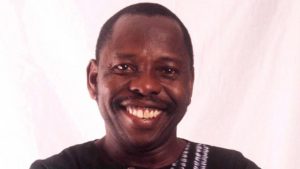
Ken Saro-Wiwa
Ken Saro-Wiwa (1941-1995) was a Nigerian writer, television producer, and environmental activist. He belonged to the Ogoni people, who are an ethnic minority in Nigeria. Once oil was found in the Ogoniland of the Niger Delta in the 1950s, millions of tonnes of crude oil have been extracted from the region by multinational oil companies, notably by Royal Dutch Shell. For the local people, however, life became a daily struggle.
The whole region has been devastated by the drilling of crude and the dumping of petroleum waste without following any environmental regulations. Though huge profits have been made by the oil companies and the Nigerian government, the Ogonis, a group of 550,000 farmers and fishermen inhabiting the coastal land, have received virtually no compensation. At the same time, their fertile farmland has become toxic fields due oil spills and acid rain. The landscape is dotted with puddles of waste oil, destroying all fish and wildlife. Nor have the Ogonis found many jobs in the oil fields.
Struggle for human rights
Ken Saro-Wiwa was the president of the Movement for the Survival of Ogoni People (MOSOP), an organization set up to defend the environmental and human rights of his tribe. It was clear to the Ogonis that the Nigerian Government was actually colluding with the oil companies to suppress the genuine demands of the Ogonis. Saro-Wiwa led a nonviolent struggle to demand a share in oil revenues and some form of political autonomy. In January 1993, 300,000 Ogoni marched peacefully under Saro-Wiwa to ask the oil companies to begin environmental remediation and pay compensation for past damage.
Saro-Wiwa was first briefly imprisoned several times. In May 1994, he was abducted from his home and put in jail along with other MOSOP leaders under a false charge in the case of the murder of four Ogoni leaders. The Nigerian military took control of Ogoniland subjecting people to mass arrest, rape, execution, and the burning and looting of their villages.
Saro-Wiwa was routinely tortured in prison, put in leg-irons, and denied access to family, friends, a lawyer and medication. In a letter smuggled out of a military hospital in May 1995, Saro-Wiwa wrote “For two nights I have not slept a wink, I am being intimidated, harassed and de-humanized, even though I am supposed to be receiving medical attention … I am like Ogoni, battered, bruised, brutalized, bloodied and almost buried”.
Execution under a false charge
In October 1995 a military tribunal tried and convicted Saro-Wiwa of murder. Governments and citizens’ organizations worldwide condemned the trial as fraudulent and urged the Nigerian dictator Abacha to spare Saro-Wiwa’s life. They also called upon Shell Oil to intervene in the matter. In spite of all such attempts, on November 10, 1995, Saro-Wiwa and his eight co-defendants were hanged. They had committed no crime except to demand sound environmental practices and to ask for compensation for the devastation of Ogoni territories.
Posthumous honours
In 1995, Saro-Wiwa was posthumously awarded the Goldman Environmental Prize. In May 1996, he was also posthumously elected to the United Nations Environment Programme’s (UNEP) Global 500 Roll of Honour for advancing the cause of environmental protection. “At all stages of his campaign, Saro-Wiwa advocated peaceful resistance to the forces that would deprive the Ogoni people of a say in the development of their region”, UNEP said. Earlier (in 1994), Saro-Wiwa and MOSOP had been awarded the “Right Livelihood Award” (known as the alternative Nobel peace prize), for their “exemplary and selfless courage and in striving non-violently for the civil, economic and environmental rights of his people.”
The misery of the Ogonis continue
After Saro-Wiwa’s death, the Ogoni cause was been taken up by other Ogoni leaders as well as his son, Ken Saro-Wiwa Jr. and Ken’s younger brother, Owens, a medical doctor. Ken Saro-Wiwa Jr., however, was not as fiery and passionate as his father. Though committed to the cause of the Ogonis, he was ready to work with the government. In fact, in 2006 he was appointed as a special adviser on peace and conflict resolution by the then Nigerian President Olusegun Obasanjo. He held official positions in later governments too.
The Ogoni region remains heavily militarized and the successive Nigerian governments have never conducted any independent environmental assessment to determine the total extent of the oil companies’ pollution of the Niger Delta. Ken Saro-Wiwa Jr. once said, “If my father were alive, he would be dismayed that Ogoniland still looks like the devastated region that spurred him to action.”
Afterword: Ken Saro-Wiwa Jr. died in London in April 2020 at the age of 47.

In the Shadow of a Saint: A Son’s Journey to Understand His Father’s Legacy is one of the book which was in my mind to read since longtime. So sad to learn Ken Sato Siva Jr. passed away.
Yes, the law of this world is in the hands of the mighty, wealthy and political forces. The have not, are merely mute spectators in this melee, unable to defend themselves and voice their concerns. Even during natural calamities, it is the poor that suffer as they have insufficient resources at their disposal. Is the law of nature also against them? In India, the Karma theory builds the required resilience and many of these go unnoticed even if we were to see it. Life goes on with all its tragedies and nature seems to balance it when something goes seriously wrong.